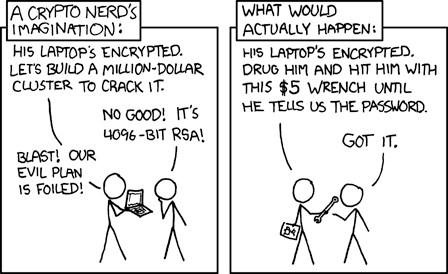Territories of Freedom
[Lengthy exposition of vulnerability of a syst[e]m to use-of-force monopolies ellided.]
You will not find a solution to political problems in cryptography.
Yes, but we can win a major battle in the arms race and gain a new territory of freedom for several years.
Governments are good at cutting off the heads of a centrally controlled networks like Napster, but pure P2P networks like Gnutella and Tor seem to be holding their own.
Satoshi[1]
There are a number of remarkable things about this quote worth pointing out.
First, there’s an air of mystery about it. Apparently, whoever Satoshi was replying to didn’t email the rest of the mailing list, and their email isn’t publicly archived anywhere, so we will probably never know the exact contents which Satoshi ellided in his short and powerful response.
This was mere days after the Bitcoin whitepaper was published. It would still be about two months before the Genesis Block was mined and the Bitcoin network was actually born. Yet Satoshi took the time to acknowledge and eloquently respond with the answer to what-makes-Bitcoin-different on a cryptography mailing list to someone who (presumably) rightfully pointed out that politics and violence in the real world can stymie any promising cryptoeconomic system’s idealistic potential.
Just as interestingly, Satoshi did directly agree with the final point raised in the quoted excerpt: “You will not find a solution to political problems in cryptography.” In other words, cryptography is nice and all, but don’t expect it to deliver any silver-bullet salvation from the ugliness of the real world. This serves as a harsh counterbalance to Bruce Schneier’s legendary quote:
There are two kinds of cryptography in this world: cryptography that will stop your kid sister from reading your files, and cryptography that will stop major governments from reading your files.
It shouldn’t come as a surprise that such a sentiment would be churning under the surface of this particular mailing list, considering the tone and content of the Cypherpunk Manifesto and the colorful (if ultimately disappointing) history of e-currency up until that point. The subject represented a well of historical frustration and wildly-exciting potential simultaneously.
Satoshi didn’t leave it at a fatalistic admission of defeat, though. He followed his “Yes,” with a “but we can win a major battle in the arms race and gain a new territory of freedom for several years.” This is a bold, ambitious, perhaps even extreme claim, but it doesn’t come across as pretentious or unrealistic. Satoshi admits that Bitcoin might not be the silver bullet to solve the world’s political problems, but he also acknowledges that it or something like it can “win a major battle” against the forces of tyranny so often manifest in violence-backed governments. Bitcoin might not be immune to “use-of-force monopolies”…

From xkcd
…but it represents a step in the right direction. Satoshi seems to suggest that this might be a fight worth fighting, even if we know that we might not decisively “win” it, and that we might take our cue from the underbelly of the Internet, teeming with P2P networks that enjoy the apparent resiliency of decentralized topologies.
Satoshi clearly saw Bitcoin (and even cryptography in general) as government-antagonistic in at least some sense, or at least able to be interpreted as such. Even more tellingly, this quote gives us a glimpse of what he saw as Bitcoin’s true potential (or even birthright): the ability to resist, undermine, or sidestep the powers-that-be, whatever their nature or size.*
*Granted, one possible interpretation of a later Satoshi quote might be considered somewhat at odds with this:
“The developers expect that this will result in a stable-with-respect-to-energy currency outside the reach of any government.” – I am definitely not making an[y] such taunt or assertion.
It’s not stable-with-respect-to-energy. There was a discussion on this. It’s not tied to the cost of energy. NLS’s estimate based on energy was a good estimated starting point, but market forces will increasingly dominate.[2]
However, it seems that Satoshi was mostly concerned with denying the claim that Bitcoin is necessarily stable-with-respect-to-energy, as the paragraph after the quote clarifies.